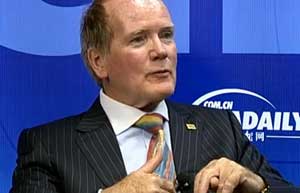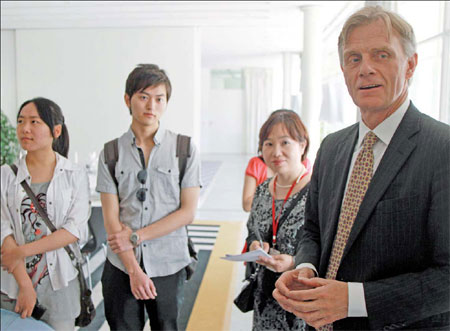Serbia may win EU candidate status, no talks yet
Updated: 2011-09-28 10:31
(Agencies)
|
|||||||||
BRUSSELS - The European Commission wants to offer Serbia the status of EU membership candidate in October but will recommend entry talks are postponed until Belgrade improves its relations with Kosovo, EU diplomats said on Tuesday.
In its annual report on countries aspiring to join the bloc, due next month, the European Union executive will want to reward Serbia for bringing remaining war crimes fugitives to justice this year, they said.
It will also want to recognise efforts Belgrade has made in reforming state institutions and combating corruption and crime, seen as important steps towards ensuring Balkan states such as Serbia are ready for the EU.
But concerns over tensions with Kosovo, Serbia's former province, mean the EU is not ready to launch actual membership negotiations, a process likely to take years before Serbia can become a member.
"It's quite sure, the Commission will recommend candidate status for Serbia but set conditions for opening negotiations," an EU diplomat said, speaking on condition of anonymity.
The former Yugoslav state applied to join the EU in 2009 but struggled to make progress in its bid because of its failure, until this year, to apprehend fugitives wanted by a United Nations war crimes tribunal.
It caught Ratko Mladic, the Bosnian Serb general accused of instigating ethnic cleansing during the 1992-95 Bosnian war, in May, and apprehended Croat Serb leader Goran Hadzic in July, after both spent years in hiding.
Many EU capitals saw their capture as crucial to settling the legacy of Balkan wars that have crippled the region.
Small steps
Serbia's relations with Kosovo, however, have deteriorated in recent weeks, amid disagreements over trade and border crossings that have turned violent on several occasions.
On Tuesday, at least 16 Kosovo Serbs and four NATO peacekeeping troops were injured in clashes at a disputed border crossing. A Kosovar policeman died in a skirmish in July.
Serbia, along with five EU members, refuses to recognise Kosovo as an independent state and considers it its historic heartland. It lost control over Kosovo in 1999, when a NATO bombing campaign halted a Serb counter-insurgency war against ethnic Albanian rebels. With Western backing, Pristina declared independence in 2008.
Many EU officials hope that pushing Serbia along the EU path will help anchor the country on a reform path, but some EU capitals are angry over its refusal to recognise Kosovo and want to see more progress in EU-mediated talks on practical cooperation between the two.
"The Commission could split its recommendation into two parts," another senior EU diplomat said. "It could start with candidate status but postpone its recommendation for a date to start talks."
"Serbia has made an overall positive effort on reforms ... the problem is the Kosovo issue," the diplomat said.
Such a recommendation from the executive could still run into opposition from EU member states, which have to give it their backing. Diplomats said Germany, among others, may still refuse to approve it without further progress on Kosovo.
Others said Commission plans could still change in the coming weeks if the situation between Kosovo and Serbia deteriorates further.
If it doesn't, Serbia could be asked to fulfill a set of specific conditions before EU governments review the possibility of launching talks. Showing results of cooperation talks held in Brussels are fully implemented could be one such condition, diplomats said. Others could include further anti-corruption reforms.
The Commission could recommend, diplomats said, that an assessment is made in the coming months, before the next review of EU enlargement progress in 12 months.
Serbia is lagging behind several of its former Yugoslav peers. Slovenia is already an EU member and Croatia, Belgrade's wartime foe, finished accession talks earlier this year and expects to join in July 2013.










